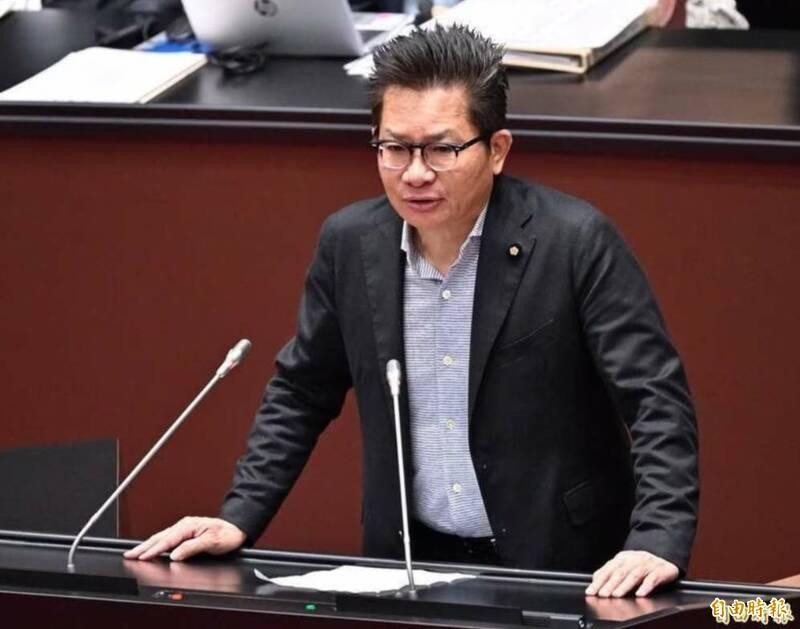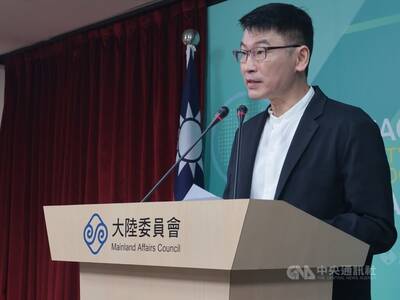Taiwan People’s Party (TPP) Legislator Wu Chun-cheng (吳春城) today denied any conflict of interest over the “strong generation” act that he pushed hard to pass, given that he was the head of the Strong Generation Association, stating he has resigned from the role.
The Democratic Progressive Party (DPP) held a news conference today accusing Wu of having a potential conflict of interest over the Act Promoting Development for Strong Generation Policies and Industries (壯世代政策與產業發展促進法).
Wu continued to serve as head of the Strong Generation Association, which he founded, until last month.

Photo: Taipei Times file photo
They accused Wu of using the association to secure contracts and register trademarks without avoiding conflicts of interest.
The DPP said that Wu used the term “strong generation” to cheat people, using what was originally a well-intentioned initiative for personal gain.
DPP caucus chief executive Rosalia Wu (吳思瑤) said the TPP proposed a budget freeze for 27 items related to the act after passing it, amounting to a total of NT$205 million after the budget freeze passed its third reading.
DPP Legislator Chen Pei-yu (陳培瑜) said companies, organizations and social enterprises that have ties with Wu had secured government procurements contracts worth a total of more than NT$20 million (US$611,900), citing the government’s procurement website.
New Power Party Chairperson Claire Wang (王婉諭) also said Wu’s family members, including his wife Chang Mei-hui (張美慧), are still holding positions in Jet-Go Consulting Group (戰國策), a well-known public relations company that has lobbied for Douyin (抖音) in the legislature in March last year and assisted in campaigning for anti-gay rights groups in the 2018 referendum on same-sex marriage.
Wu last year declared that Chang held 60,000 shares in Jet-Go Consulting Group, but had not disclosed that Chang is the chairperson of Zhuang Shi Dai Social Enterprise (壯世代社會企業) and holds 100,000 shares in the company, according to business registration information and civil servants’ property declaration information disclosed by the Ministry of Economic Affairs and the Control Yuan.
Zhuang Shi Dai Social Enterprise and Jet-Go Consulting Group both registered their address at Chung Hsiao West Road in Taipei’s Zhongzheng District (中正).
“Has he not crossed the red line of conflict of interest?” Wang asked.
Regarding the budget freeze controversy, Wu said the TPP’s proposal is to urge the administration to execute the act but not cut budgets, so it is a means to communicate instead of pursuing personal gains or containing “malicious” intentions.
Wu said he had resigned from all positions in the association and has no power to make decisions.
Wu recently discussed the matter with the association and made a statement on its behalf.
The association would not participate in any government contracts and the “strong generation” trademark would be made freely available for public welfare purposes, the statement said.
The trademark is meant to ensure that the “strong generation” concept is properly communicated and prevent its commercial exploitation, Wu said.
Trademarking the term was purely for public welfare, not personal interest, and he has not received any related fees for his efforts, Wu said.
Since his book Spring of the Strong Generation was published in 2022, Wu has been committed to encouraging those aged 55 and older to not be limited by their age, Wu said.
His ideas were hailed by former TPP chairman Ko Wen-je (柯文哲) in 2023, who invited him to be a legislator for the party, he said.
After joining the Legislative Yuan, Wu promoted the “strong generation” act and ultimately succeeded in getting it passed with the support of all three parties.
The bill defines the “strong generation” as those aged 55 and over with the ability and willingness to work.
It stipulates that the government is responsible for making policies that help the “strong generation” lead a better life.
Wu would work alongside other legislators who care about the “strong generation” to realize the goal of “a strong generation means a strong Taiwan,” he said.
Additional reporting by Fang Wei-li

ENDORSING TAIWAN: Honduran presidential candidate Nasry Afura said that Honduras was ‘100 times better off’ when it was allied with Taipei The Ministry of Foreign Affairs yesterday said it would explore the possibility of restoring diplomatic relations with Honduras based on the principle of maintaining national interests and dignity. The ministry made the remarks in response to reporters’ questions regarding an article titled: “Will Taiwan Regain a Diplomatic Ally?” published in The Diplomat on Saturday. The article said Honduras’ presidential election in November could offer Taiwan the chance to regain an ally, as multiple candidates have promoted re-establishing diplomatic relations with Taiwan. Honduras severed diplomatic ties with Taiwan in March 2023 in favor of Beijing, but since switching its diplomatic recognition,

A fourth public debate was held today about restarting the recently decommissioned Ma-anshan Nuclear Power Plant, ahead of a referendum on the controversial issue to be held in less than two weeks. A referendum on Aug. 23 is to ask voters if they agree that “the Ma-anshan Nuclear Power Plant should continue operations upon approval by the competent authority and confirmation that there are no safety concerns.” Anyone over 18 years of age can vote in the referendum. The vote comes just three months after its final reactor shut down, officially making Taiwan nuclear-free. Taiwan People’s Party Chairman Huang Kuo-chang (黃國昌) represented

Scoot announced yesterday that starting in October, it would increase flights between Taipei and Japan’s Narita airport and Hokkaido, and between Singapore and Taipei. The low-cost airline, a subsidiary of Singapore Airlines, also said it would launch flights to Chiang Rai in Thailand, Okinawa and Tokyo’s Haneda airport between December and March next year. Flights between Singapore and Chiang Rai would begin on Jan. 1, with five flights per week operated by an Embraer E190-E2 aircraft, Scoot said. Flights between Singapore and Okinawa would begin on Dec. 15, with three flights per week operated by Airbus A320 aircraft, the airline said. Services between Singapore

The Mainland Affairs Council (MAC) yesterday announced a ban on all current and former government officials from traveling to China to attend a military parade on Sept. 3, which Beijing is to hold to mark the 80th anniversary of the end of the Second Sino-Japanese War. "This year marks the 80th anniversary of the end of World War II and the Republic of China’s victory in the War of Resistance [Against Japan]," MAC Deputy Minister and spokesperson Liang Wen-chieh (梁文傑) told a regular news briefing in Taipei. To prevent Beijing from using the Sept. 3 military parade and related events for "united